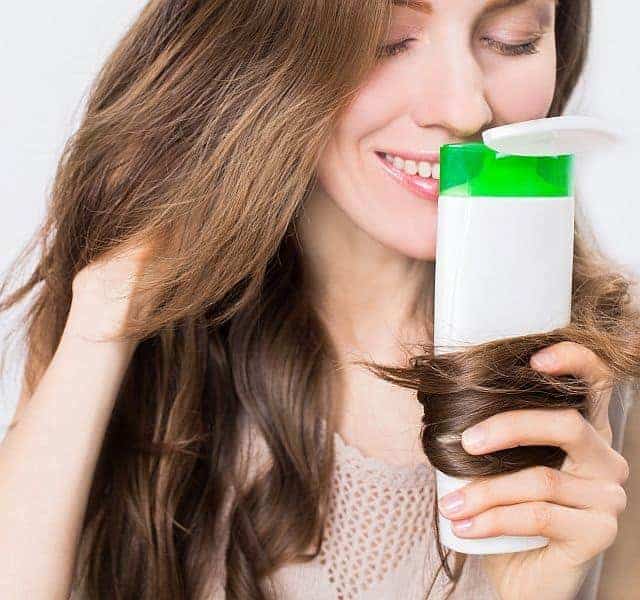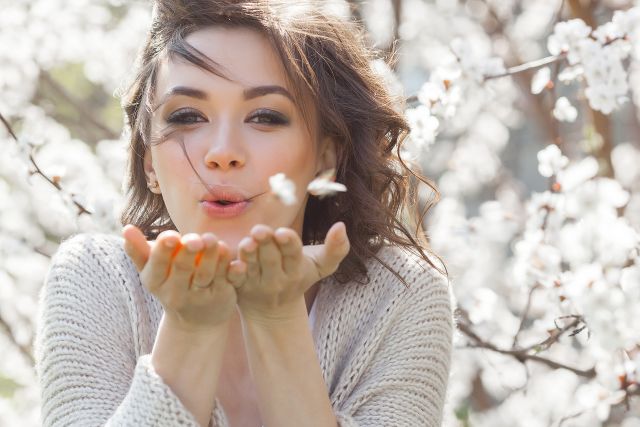Last Updated on January 2, 2023 by Gaga
The fragrance is a blend of different ingredients that gives a pleasant scent to cosmetic products. Fragrance ingredients can be naturally sourced such as essential oils or created with synthetic chemicals in a lab.
A large percentage of shampoos (96%), conditioners (98%), and hair styling products (97%), contain fragrances.
The main reason for adding fragrances to hair shampoos is to give the product a clean and nice scent that will attract buyers. Fragrances can also be listed as “perfume” on your shampoo label. However, chemical compounds in a fragrance blend are not specified on the label.
Fragrances can also be added to hair care products to mask the bad odors of certain ingredients.

Difference Between “Unscented” and “Fragrance-Free” Shampoo
It is important to note that there is a difference between cosmetic products that are labeled “unscented” and those that are labeled “fragrance-free”. The term “unscented” means that only the aromatic fragrances intended to give nice smells are excluded from the formula. “Unscented” products still may contain functional fragrances used to mask the unpleasant odors of some ingredients. The term “fragrance-free” means that the product doesn’t contain any form of fragrance. Such a product is also free of artificial and natural scents, including essential oils.
Is Fragrance Bad for You?
The majority of people are unaware of the potential dangers hidden in their heavenly-smelling hair products. Prolonged exposure to certain fragrances can worsen some health problems. Some synthetic chemicals in fragrances have been linked to respiratory issues such as sinus attacks and asthma, while some may provoke allergic reactions. Some fragrances could even mess with our body’s hormones’ function.
How Do Fragrances Enter Your Body?
There are two main ways how fragrances enter your body:
Skin: Your skin is considered the primary way of exposure to fragrances. When problematic ingredients get absorbed into the skin, they may result in eczema, allergies, inflammation, or rashes. In addition to being harmful to the skin, some compounds can enter the bloodstream and the fatty tissues, which then can affect the vital organs. It is important to note that residues of fragrances may remain on the hair and skin even after repeated washings.
Inhalation: Another way you can be exposed to fragrances is through inhalation. Fragrances are made of small molecular-weight substances that quickly dissipate in the air. When inhaled, these compounds go into the lungs and can affect the brain and nervous system. This affects hormone control and is a potential source of health hazards for people who have migraines, allergies, sinus problems, asthma, and lung diseases. Regardless of the route of entry, these chemicals can build up in the body.
Environmental Concerns
Fragrances are rather aggressive substances that affect the quality of the indoor and outdoor air. The chemicals may get dispersed into the environment as a result of being washed into groundwater, and the waterways. They can be ingested by fishes and other aquatic life, contributing to the contamination of the ecosystem.
How to Protect Yourself and Others?
The ideal approach is to opt for fragrance-free cosmetic products whenever possible. Hair shampoo is used frequently and in combination with other chemical-laden personal care products can pose a health risk. Therefore, it is advisable to use hair shampoos that are labeled “scent-free”, “fragrance-free” or “unscented”.
Fragrance-free personal care products can be purchased at any pharmacy, some supermarkets, and most online stores. Make sure to always look at the ingredients on the label, and when possible, also check the product for smells with your nose. This is a good way to ensure that there is no scent regardless of what is written on the package.
By opting for cosmetic products that are fragrance-free, you are doing good for your body. In addition, you will be contributing your quota towards creating an environment that is safe and healthy.

Fragrance-Free Shampoos
The following is a short list of hair shampoos made without synthetic fragrances and other harmful chemicals:
- JASON Fragrance-Free Daily Shampoo is particularly suitable for people with sensitive scalps. Since 1959 the JĀSÖN company has been creating natural and eco-friendly cosmetics. Their products have become a healthy and environmentally friendly alternative to chemical-laden cosmetic products.
- Fragrance-Free Shampoo Conditioner Bundle by Desert Essence
is a gentle yet effective unscented duo for washing your hair. Desert Essence beauty products don’t contain artificial fragrances, colors, parabens, phthalates, sodium lauryl/laureth sulfates, silicones, EDTA, phosphates, glycol, or petroleum-based ingredients.
- Pharmaceutical Specialties Free & Clear Hair Shampoo for Sensitive Skin
is a mild shampoo suitable for sensitive scalps. It is free from fragrances and other harsh chemicals that can be found in commercial hair shampoos.
- No Nothing Very Sensitive Shampoo is fragrance-free, vegan, and formulated without harmful chemicals. The No Nothing is a Finland beauty company committed to making hypoallergenic hair products.
What Is Hidden Under the Label?
The manufacturers don’t have to individually list the ingredients used to give their products the “signature smell”, because this is considered a “trade secret”. You just can read “fragrance” on the ingredients list. Over 3,000 chemicals used to create fragrances are hidden on the label as “fragrance” or “perfume”. Some fragrances could include phthalates to make the smell last longer. Phthalates are a group of harmful chemicals known for their endocrine-disrupting effects, but consumers have no idea that these compounds are hidden inside their shampoo bottles. Due to undisclosed fragrance ingredient information, phthalates in fragrance formulations are not required to be listed either.
Although fragrances can make your hair smell amazing, they can do more harm than good in the long run. If you do opt for scented shampoos, choose products that use natural fragrances like essential oils.

Gaga is a blogger and founder of the Softer Hair website. She often says that insomnia is to blame for her first blogging attempts. Being the night owl, she hated the morning alarm. She left her office job and returned to what she loved most - writing.


It’s good to go with fragrance-free shampoos as it causes very minimal damage to hair and scalp.